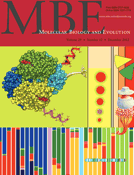
MOLECULAR BIOLOGY AND EVOLUTION
Scope & Guideline
Advancing Knowledge in Genetics and Evolution
Introduction
Aims and Scopes
- Molecular Evolution and Phylogenetics:
Research in this area investigates the evolutionary relationships between species using molecular data, including DNA, RNA, and protein sequences. The methodologies often involve phylogenetic analysis and molecular clock techniques to understand the timing and patterns of evolutionary events. - Genomic and Transcriptomic Analyses:
This scope focuses on the study of genomes and transcriptomes to uncover evolutionary adaptations and mechanisms. Researchers employ high-throughput sequencing technologies to analyze genetic variation, gene expression, and evolutionary dynamics across different species. - Adaptive Evolution and Environmental Responses:
Studies under this aim explore how organisms adapt to changing environments through genetic and phenotypic changes. This includes research on the genetic basis of traits that confer fitness advantages under specific ecological conditions. - Horizontal Gene Transfer and Gene Duplication:
This area examines the roles of horizontal gene transfer and gene duplication in shaping genetic diversity and evolutionary innovation. It includes investigations into how these processes contribute to the evolution of new functions and adaptations in various organisms. - Evolutionary Developmental Biology:
Research in this domain integrates evolutionary biology with developmental processes, focusing on how developmental pathways and genetic networks influence evolutionary outcomes. This includes the study of morphological evolution and the genetic basis of developmental traits. - Population Genomics and Evolutionary Dynamics:
This scope analyzes genetic variation within and between populations to understand evolutionary processes such as selection, drift, and gene flow. It often employs statistical models and computational tools to infer demographic histories and adaptive responses.
Trending and Emerging
- Integrative Genomics and Multi-Omics Approaches:
There is a growing trend toward integrating various omics data (genomics, transcriptomics, proteomics) to gain comprehensive insights into evolutionary processes and adaptations. This approach allows researchers to explore complex interactions at multiple biological levels. - Evolutionary Genomics of Host-Pathogen Interactions:
Research focusing on the genetic and evolutionary dynamics between hosts and pathogens is gaining prominence, particularly in understanding disease resistance and the co-evolutionary arms race between species. - Environmental Genomics and Climate Adaptation:
Studies investigating how organisms adapt to changing environmental conditions, particularly in the context of climate change, are increasingly relevant. This includes research on genomic signatures of adaptation and resilience in various species. - Evolutionary Developmental Genomics:
The intersection of developmental biology and evolutionary theory is emerging as a key area of interest. Research is increasingly focused on understanding how developmental processes influence evolutionary outcomes and diversity across taxa. - Machine Learning in Evolutionary Analysis:
The application of machine learning and advanced computational methods to analyze large genomic datasets is becoming more common. This trend reflects the increasing complexity of evolutionary questions and the need for sophisticated analytical tools.
Declining or Waning
- Traditional Morphological Studies:
Research focusing solely on morphological traits without molecular data is becoming less prominent as molecular techniques provide more detailed insights into evolutionary relationships and processes. - Single-Gene Studies:
There is a trend away from studies that focus on the evolution of a single gene in isolation, as the field increasingly emphasizes the importance of gene networks and interactions in evolutionary biology. - Laboratory-Based Evolution Experiments:
While these studies have historically been important, there appears to be a shift towards field-based and integrative approaches that consider ecological and evolutionary dynamics in natural environments. - Basic Descriptive Studies in Ecology and Evolution:
Research that primarily describes ecological or evolutionary patterns without a strong mechanistic or molecular component is becoming less favored in favor of studies that integrate molecular data and evolutionary theory.
Similar Journals

Evolutionary Biology
Advancing Knowledge in Evolutionary SciencesEvolutionary Biology is a distinguished academic journal published by Springer, focusing on the intricate fields of ecology, evolution, behavior, and systematics. This journal, with the ISSN 0071-3260 and E-ISSN 1934-2845, has established itself as a critical platform for cutting-edge research and innovative ideas that shape our understanding of biological evolution and its implications. Operating from Germany, it ranks in the Q2 quartile in its category for 2023, placing it in the top tier of journals recognized for quality and impact, with a Scopus rank in the 66th percentile among its peers. Despite not being Open Access, this journal ensures comprehensive dissemination of knowledge essential for researchers, professionals, and students passionate about evolutionary studies. With a publication history tracing back to 1993 and converging years up to 2024, Evolutionary Biology continues to significantly impact the academic landscape, fostering dialogue and collaboration across various disciplines within the biological sciences.

CURRENT GENETICS
Navigating the Complexities of GeneticsCURRENT GENETICS is a prestigious journal published by SPRINGER, dedicated to advancing the field of genetics through the dissemination of high-quality research. With a notable impact factor and ranking in the Q2 category for both Genetics and Medicine (miscellaneous) as of 2023, it firmly establishes itself as a significant resource for the academic community. The journal’s comprehensive scope explores the latest findings in genetic research, along with accompanying interdisciplinary studies, providing a platform for researchers to share innovative ideas and methodologies. ISSN: 0172-8083, E-ISSN: 1432-0983, stands testament to its commitment to scholarly excellence. While Open Access options are not currently available, CURRENT GENETICS remains accessible to a broad audience, promoting a rich exchange of knowledge that supports the vast and evolving discipline of genetics. Since its inception in 1979 and through its converged years till 2024, this journal has played a crucial role in confronting scientific challenges and promoting advancements in genomic medicine and molecular biology. As such, it is an essential read for researchers, professionals, and students keen to remain at the forefront of genetic research.

G3-Genes Genomes Genetics
Championing High-Quality Research in GenomicsG3-Genes Genomes Genetics is a prominent open access journal published by Oxford University Press, Inc., dedicated to advancing the field of genetics and genomics. Since its inception in 2011, the journal has become a vital resource for researchers, professionals, and students, featuring high-quality, peer-reviewed articles that cover a broad spectrum of topics within genetics, including clinical genetics and molecular biology. With an impressive standing reflected in its 2023 Scopus rankings, which positions it in the Q2 category for Genetics (Clinical) and Q1 for Medicine (Miscellaneous), G3 remains at the forefront of scholarly communication in these disciplines. The journal's commitment to open access ensures that cutting-edge research is accessible to a global audience, stimulating collaboration and innovation in the field. For those eager to explore the latest in genetic research, G3 serves as an indispensable platform, inviting contributions that push the boundaries of scientific understanding.

GENETICS AND MOLECULAR RESEARCH
Advancing the Frontiers of Genetics and Molecular BiologyGENETICS AND MOLECULAR RESEARCH is a distinguished academic journal published by FUNPEC-EDITORA, focusing on the rapidly evolving fields of genetics and molecular biology. Since its inception in 2002, the journal has provided a platform for high-quality research and advancements that contribute to our understanding of genetic mechanisms and molecular interactions. With an impressive convergence period extending through 2024, this open-access journal presents vital insights while maintaining accessibility for researchers, professionals, and students alike. Though currently positioned in the Q4 quartile in Genetics, Medicine (Miscellaneous), and Molecular Biology as per the latest 2023 rankings, its persistent publication efforts aim to elevate its influence within the academic community. Researchers are invited to explore groundbreaking studies that may inform future developments in these critical scientific domains.

CLADISTICS
Advancing the Frontiers of Evolutionary ScienceCLADISTICS is a premier academic journal published by WILEY, dedicated to advancing the fields of ecology, evolution, behavior, and systematics since its inception in 1985. Renowned for its rigorous peer-review process and commitment to high-quality research, the journal is listed in the top quartile (Q1) of its category as of 2023, ranking 50th out of 721 journals in the Scopus database, placing it in the 93rd percentile. This significant standing underscores its critical role in the dissemination of pioneering research and methodologies that are shaping modern evolutionary biology. With a focus on clade-based phylogenetic studies and their applications, *CLADISTICS* serves as a vital resource for researchers, professionals, and students alike, fostering a deeper understanding of biodiversity and evolutionary processes. Although it does not offer open access, the journal is committed to providing comprehensive, state-of-the-art content that continues to influence the scientific community and guide future research directions.

Evolutionary Bioinformatics
Innovating the intersection of biology and computation.Evolutionary Bioinformatics, published by SAGE Publications Ltd, is a pioneering open-access journal established in 2005, dedicated to advancing the field of evolutionary biology through innovative computational techniques and bioinformatics. With an ISSN of 1176-9343, it serves as a critical platform for researchers, professionals, and students to disseminate impactful findings and foster collaboration across disciplines. The journal spans a broad scope, contributing significantly to the areas of Ecology, Evolution, Behavior and Systematics, and Genetics, as evidenced by its respectable Scopus rankings and quartile placements in 2023. With a commitment to providing comprehensive, peer-reviewed research articles and tools for sharing knowledge, Evolutionary Bioinformatics plays an essential role in shaping the future of evolutionary studies and bioinformatics. Readers and contributors alike are encouraged to engage with cutting-edge research that pushes the boundaries of understanding in this dynamic field.

JOURNAL OF EVOLUTIONARY BIOLOGY
Fostering Insights into Life’s Adaptive StrategiesJOURNAL OF EVOLUTIONARY BIOLOGY, published by Wiley, is a prestigious, peer-reviewed journal that has served as a key platform for groundbreaking research in the field of evolutionary biology since its inception in 1988. With its remarkable Q1 status in the 2023 category of Ecology, Evolution, Behavior, and Systematics, the journal is recognized for its high-quality contributions and impactful findings, currently ranking 203 out of 721 in its category on Scopus, placing it in the 71st percentile. The journal covers a wide scope of topics, fostering discussions that advance our understanding of evolutionary processes and their applications, which is critical for researchers, academics, and students alike. While it does not offer Open Access options, subscribers can benefit from articles that explore diverse aspects of evolution and biodiversity. As the journal continues to evolve, it remains an essential resource for those keen on exploring the mechanisms of life’s diversity and adaptation.

BMC Genomic Data
Connecting the dots in genetics and health informatics.BMC Genomic Data is a pioneering open-access journal dedicated to the dynamic field of genomics and health informatics, published by BMC, a renowned leader in scientific publishing based in the United Kingdom. Since its inception in 2021, the journal has established itself as a valuable resource for researchers, professionals, and students, providing a platform for the dissemination of high-quality genomic data research. With a focus on advancing knowledge in both genetics and health informatics, BMC Genomic Data holds a Q3 ranking in both categories as of 2023, indicating its growing influence and relevance in the scientific community. The journal has an impressive entry into the competitive landscape of academia, ranking #55 in the Medicine & Health Informatics category and #173 in Biochemistry, Genetics and Molecular Biology, reflecting its commitment to publishing impactful research. By offering an open-access model, researchers are encouraged to disseminate their findings widely, contributing to the ongoing dialogue in genomics. For those looking to stay at the forefront of genomic research and data analysis, BMC Genomic Data is an essential resource that promotes innovation and collaboration across disciplines.

Genes
Innovating understanding in clinical genetics and molecular biology.Genes is a leading open-access journal published by MDPI that focuses on advancing the field of genetics and genomics. Established in 2010 and based in Basel, Switzerland, this journal has made significant strides in promoting innovative research in both clinical genetics and molecular biology. With an impact factor reflecting its relevance and quality, Genes has been classified in the Q2 quartile for Genetics and the Q3 quartile for clinical Genetics as of 2023. The journal provides an accessible platform for researchers, professionals, and students to disseminate their findings and explore emerging trends across the genetics landscape. Accessible online since its inception, Genes allows for continuous engagement and collaboration within the scientific community, fostering a deeper understanding of genetic mechanisms and their implications in health and disease.

NATURE REVIEWS GENETICS
Bridging Basic Science and Clinical Genetics.NATURE REVIEWS GENETICS, published by NATURE PORTFOLIO, stands as a leading journal in the field of genetics, boasting a remarkable reputation reflected in its Q1 ranking across multiple categories including Genetics, Clinical Genetics, and Molecular Biology. With an impressive percentile of 99th in both Genetics and Clinical Genetics, as well as a solid rank in Molecular Biology, this journal is pivotal for researchers, professionals, and students alike who seek to stay informed on the latest advancements and comprehensive reviews in genetic research. The journal's scope encompasses a wide array of topics, providing in-depth insights from fundamental genetic principles to clinical applications, underscoring its importance in bridging basic science and medical practice. Though not an open-access publication, it remains accessible through various academic institutions, enhancing its reach and influence within the scientific community. With publication years spanning from 2000 to 2024, NATURE REVIEWS GENETICS continues to shape the future of genetics research and education.